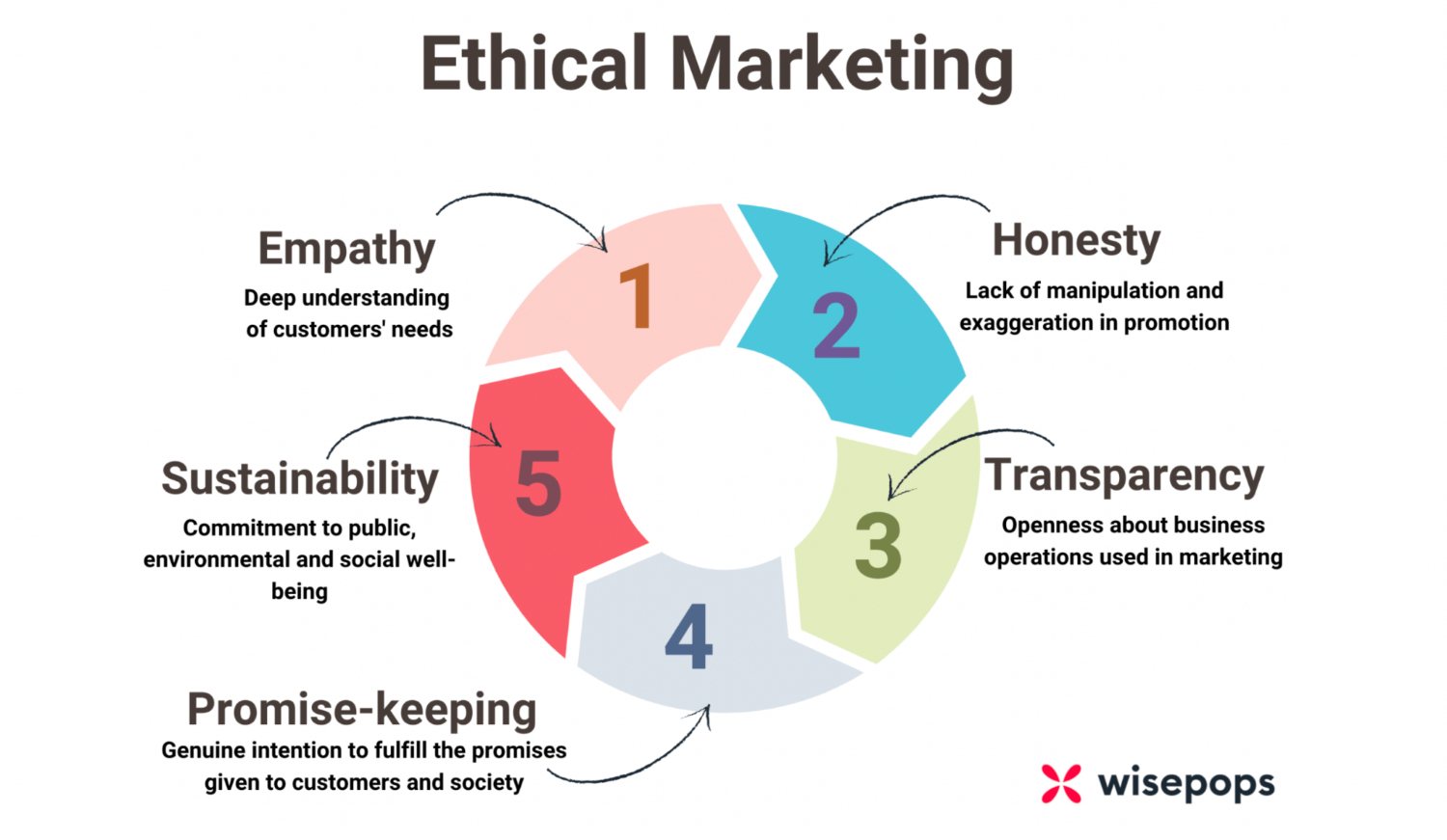According to a recent survey, younger consumers tend to buy products from companies that take the initiative to tackle some societal problems and are not solely focused on their bottom line. Companies have understood that they need to change their marketing strategies to attract millennial and Gen Z consumers. Hence, increasingly, businesses are trying to incorporate societal and ethical marketing philosophies in their marketing strategies.
This article will answer the question, “What is Ethical Marketing?” The principles of Ethical Marketing and its advantages and disadvantages. The following examples will also explain how the principles of Ethical Marketing work and why supporting a worthy cause is essential for a brand.
We will also learn how ethical marketing efficiently improves the brand image.
What is Ethical Marketing? Core Concept
Defining ethical marketing is very difficult because the answer to what ethical changes is from person to person and tradition to tradition. So if something is considered ethical in one country, it may be viewed as unethical in another.
It applies ethics, moral values, and rules to developing marketing and strategy. Ethical marketing is more of a marketing philosophy than a technique. Businesses prioritize ensuring that their advertisements are honest and do not mislead customers by being blinded by greed.
This approach helps them establish long-lasting customer relationships and build trust in their brand or product.
What are the Principles of Ethical Marketing?
Following are some of the fundamental principles of ethical marketing:
Fairness
Companies should commit to fair policy-making practices. This will lead the company to commit to fair product prices and better employee wages. This also puts the company on a path of sustainable development and growth.
Honesty
People consider honesty in their actions and words as the foundation of ethical behavior, which also applies to companies and businesses. Companies ought to promote and advertise their products and brand truthfully. The information conveyed through these advertisements should be factually accurate and not exaggerated.
Companies should never mislead customers into buying products or services they do not need solely to increase profits. This honesty is first displayed by your brand’s message, highlighting the importance of what is a Boilerplate in marketing.
Responsibility
Companies should be held responsible for their policies and actions by the government, customers, and companies. A company has many responsibilities towards its customers, employees, investors, and society. They can carry out these responsibilities by providing reliable and quality products and services, treating their employees with dignity, and supporting a social cause.
Transparency
Ethical marketing also entails businesses making transparent policy decisions. This means companies should be open and truthful to the public regarding their operations and transactions. Companies should also be transparent about the environmental impact of their products and services.
2 Best Examples of Ethical Marketing
Following are some real-life examples of businesses and brands implementing ethical marketing techniques.
Everlane
Textile manufacturing has been one of the controversial industries in recent years. Starting from the fast fashion trend worldwide to accidental fires in Bangladesh, the industry is having disastrous effects on the environment. These incidents have made people more aware of how our clothes are manufactured.
Hence, the demand for an ethical brand with sustainable manufacturing methods has grown recently. One such company is Everlane, founded by Michael Preysman. Everlane is focused on manufacturing clothes ethically and sustainably. Their factories have stringent operating policies, rules on treating workers, and stringent quality standards.
As an ethical company, Everlane is very thoughtful about how its employees are treated and how their products affect the environment. But their commitment to transparency makes them stand out among other companies.
Everlane is not content with telling its customers how and where its products are manufactured. They also give detailed information about the production cost for every product in their clothing line and their selling price. This is very unusual because companies keep the production cost closely guarded.
The company becomes very vulnerable when you share your production costs because people can calculate a brand’s profit margins, and this may highlight the poor conditions and pay of factory workers. This shows that Everlane doesn’t just talk but also successfully implements all its policies.
Conscious Coffees
The coffee industry is one of the globe-spanning businesses drastically affected by global warming and rapid climate change. Recent studies have predicted that almost 50% of the farmland for coffee beans may be lost due to climate change and excessive use of chemical pesticides and fertilizers.
Hence many companies are actively working and supporting welfare organizations to improve the conditions of farmlands and the workers employed there. One such company is Conscious Coffees.
Conscious Coffees doesn’t only follow the principles of ethical marketing but embodies the philosophy of ethical marketing in the brand’s core values. It has strict policies to ethically and sustainably farm coffee beans and transparent and fair trade policies to ensure that the farmers and workers are not underpaid for their work.
Conscious Coffees also takes part in various community outreach programs in various countries. For example, CAFE Livelihoods Program, based in El Salvador, Guatemala, Mexico, and Nicaragua, help the native people and empowers them to own and operate their coffee business.
FAQs
Are Ethical Marketing and Sustainable Marketing Different?
Yes, it is different, even though they might sound similar. One of the differentiating factors is that ethical marketing promotes the application of marketing ethics, or a set of moral values and rules set by the brand, to the marketing process. On the other hand, sustainable marketing promotes using a socially and ecologically responsible set of values in the marketing process. It can also be said that sustainable marketing is a subset of ethical marketing for the above reasons.
What are the benefits of ethical marketing?
Some of the benefits of ethical marketing are as follows: Ethical marketing promotes a transparent business model. Helps maintain long-lasting relationships with customers. Creates a trusting and caring brand image. It helps businessmen maintain a clean conscience. It helps instill the ideology that companies have an economic responsibility towards their investors and a social responsibility towards the community.
Conclusion
Businesses should embrace ethical marketing as their core philosophy and not just a marketing gimmick or goal to promote products and boost sales. Most people think discussing sustainable development and ethical business practices is very simple, and implementing it in the real world is nearly impossible. But the companies mentioned above have already been established.
You can run a successful and profitable business without cutting corners and making compromises that hurt the customer or the environment.
Hopefully, this post has helped you and given you some idea about ethical marketing and how to implement it. I know that not every business can embody the ethical marketing policy, but we can try implementing some of the principles in the business.
See Also: Trade Show Marketing (Ideas + Examples) – Ultimate Guide




